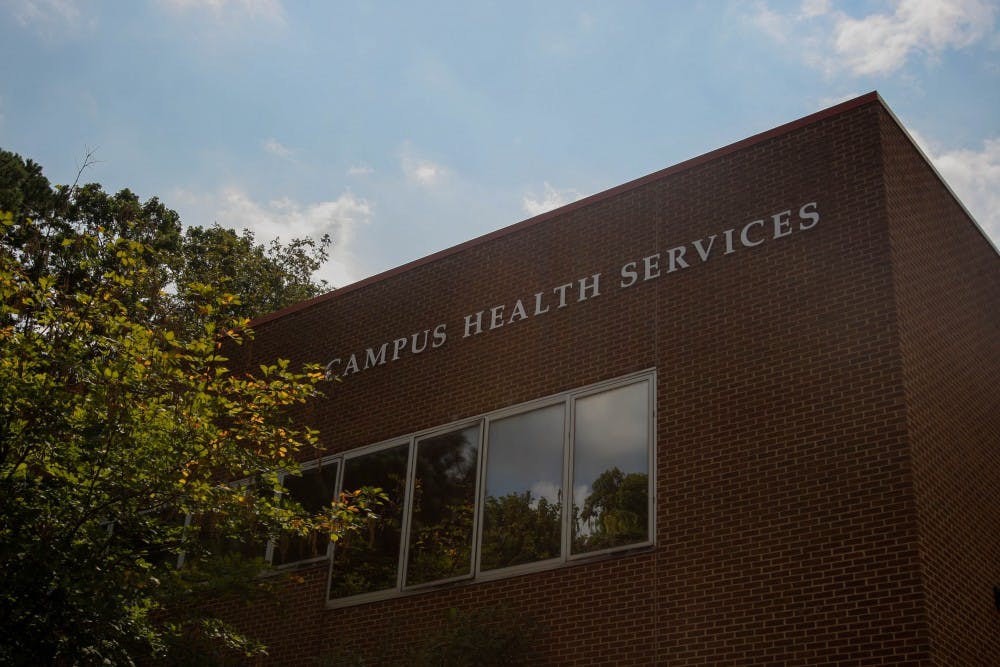“She told me once I came back, and if I decided that I wanted to continue seeing someone that I could just talk to her, and she would find someone that worked with my insurance, someone that worked best with what I was going through at the time,” Elliott said. “She would find a therapist for me, so I wouldn’t have to go through the stress of finding someone.”
At UNC-CH and Duke, 30 percent of students who visit CAPS are referred to outside providers for long-term therapy, according to the University. At UNC-C, this figure is much lower: 12.2 percent.
Dr. Allen O’Barr, the director of UNC-CH's CAPS, said CAPS does its best to make treatment feasible for every student.
“During that referral coordination appointment, the coordinator looks at the insurance, the request by the student, what the student’s transportation is, all that kind of stuff to see if they can find the thing that is the cheapest option and the best option for the student,” he said. "We have a number of providers in the community who operate on a sliding scale."
O’Barr said a number of the University’s initiatives over the past decade, including the student health insurance mandate and requiring referral coordination for every student referred outside of CAPS, have helped increase accessibility.
Elliott said CAPS provided her with an avenue for treatment that she wouldn’t have had otherwise.
“Just being able to go to a free counseling service was probably the reason why I’m going to pay to go to counseling services now,” she said.
A UNC-CH student and Covenant scholar who visited CAPS two years ago for anxiety and depression and asked to remain anonymous due to privacy concerns said CAPS’ short-term model was not ideal for her.
“For a lot of people that struggle with mental health, it’s a long-term thing, and it’s not something that resolves in a couple of months, and that was something I had a really hard time with,” she said.
She said she wasn’t informed of CAPS’ short-term model until about halfway through her therapy sessions, when she was told that her last appointment would be two to three sessions away. She said she was informed about the referral process in vague terms, but knew that she wouldn’t be able to afford the copay.
“I felt like ‘This is the amount of time I have left, and then, it’s over, and whatever happens to my mental health happens,’” she said.
'We have chosen to prioritize'
To get the day's news and headlines in your inbox each morning, sign up for our email newsletters.
Sue Wasiolek, the associate vice president for student affairs and dean of students at Duke, said in an email that most counseling centers encounter a tension between addressing students’ needs quickly and adequately, due to the increasing demand for college counseling services, so they end up opting for a short-term care model rather than long-term.
“For safety reasons, we have chosen to prioritize rapid access to assessment and crisis intervention services,” she said.
Between 2012 and 2017, screenings at UNC-CH CAPS increased by 101.9 percent. At UNC-C, the number of students using counseling services represents a 9 percent increase compared to this time last year, said Leigh Norwood, the assistant director for counseling services at UNC-C.
Wasiolek said Duke's counseling services are often able to connect low-income students to financial assistance for their care at outside providers.
Norwood said the University does not have resources to support low-income students with the out-of-pocket costs they might incur at outside providers, but has been in contact with Student Assistance and Support Services about potential funding opportunities.
She said many students of low socioeconomic status deal with trauma and family-of-origin concerns, such as being first-generation or balancing their course load with a full-time job.
Because of her therapist’s limited availability, Elliot said she had to skip class twice and work once to attend her sessions.
“I think it’s kind of dangerous for students to have to miss class to get therapy and counseling services because missing class can add to the problem of anxiety,” Elliott said.
Elliott and the anonymous UNC-CH student both said the reality of being low-income can in itself be a big stressor.
Norwood said initiatives like CAPS Open House & Fall Festival, extended hours and a 24/7 helpline — also available at Duke and UNC-CH — have helped make CAPS more accessible to low-income UNC-C students.
“One of the goals was to be able to have students from marginalized communities be able to come and experience what the feel of a therapist’s office is to reduce stigma and also to let them know where we’re located, if they ever need to know how to make an appointment, things like that just to become familiar with our services,” she said.
O’Barr said UNC-CH CAPS continues working to improve care as service requirements and students’ needs increase.
“We’re just trying to take care of every student with their individual needs and provide what we can to make it affordable for them,” he said.
@SLesnewski
city@dailytarheel.com



